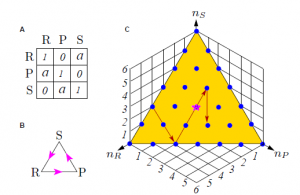How to Win at Rock-Paper-Scissors
From the post:
The first large-scale measurements of the way humans play Rock-Paper-Scissors reveal a hidden pattern of play that opponents can exploit to gain a vital edge.
If you’ve ever played Rock-Paper-Scissors, you’ll have wondered about the strategy that is most likely to beat your opponent. And you’re not alone. Game theorists have long puzzled over this and other similar games in the hope of finding the ultimate approach.
It turns out that the best strategy is to choose your weapon at random. Over the long run, that makes it equally likely that you will win, tie, or lose. This is known as the mixed strategy Nash equilibrium in which every player chooses the three actions with equal probability in each round.
And that’s how the game is usually played. Various small-scale experiments that record the way real people play Rock-Paper-Scissors show that this is indeed the strategy that eventually evolves.
Or so game theorists had thought… (emphasis added)
No, I’m not going to give away the answer!
I will only say the answer isn’t what has been previously thought.
Why the different answer? Well, the authors speculate (with some justification) that the smallness of prior experiments resulted in the non-exhibition of a data pattern that was quite obvious when done on a larger scale.
Given that N < 100 in so many sociology, psychology, and other social science experiments, the existing literature offers a vast number of opportunities where repeating small experiments on large scale could produce different results. If you have any friends in a local social science department, you might want to suggest this to them as a way to be on the front end of big data in social science. PS: If you have access to a social science index, please search and post a rough count of participants < 100 in some subset of social science journals. Say since 1970. Thanks!
